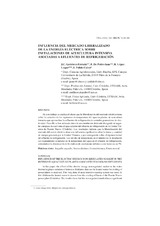Influencia del mercado liberalizado de la energía eléctrica sobre instalaciones de acuicultura intensiva asociadas a efluentes de refrigeración
Influence of the electric energy non-regulated market in the intensive aquaculture plants associated to cooling effluents

Ver/
Autor
López Luque, Rafael
Gutiérrez-Estrada, J.C.
De Pedro, E.
Pulido-Calvo, I.
Editor
Asociación Interprofesional para el Desarrollo AgrarioFecha
2004Materia
Anguilla anguillaSector eléctrico
Centrales térmicas
Estrés termal
Electric sector
Power plant
METS:
Mostrar el registro METSPREMIS:
Mostrar el registro PREMISMetadatos
Mostrar el registro completo del ítemResumen
En este trabajo se analiza el efecto que la liberalización del mercado eléctrico tiene
sobre la variación de los regímenes de temperatura del agua en plantas de acuicultura
intensiva que aprovechan los efluentes de refrigeración de centrales generadoras de electricidad.
Para ello se han utilizado datos de una instalación dedicada al engorde de anguilas
europeas, la cual toma el agua caliente del efluente de refrigeración de la Central Térmica
de Puente Nuevo (Córdoba). Los resultados indican que la liberalización del
mercado del sector eléctrico tiene una influencia significativa sobre la forma y cantidad
de energía generada por la Central Térmica, y por consiguiente sobre el régimen termal
del efluente de refrigeración. Los niveles de temperatura en el interior de la instalación
son dependientes asimismo de la temperatura del agua en el efluente de refrigeración,
estimándose la disminución de los índices de crecimiento debidos a este factor en un 5%. In this paper, the effect of the electric energy non-regulated market in the water
thermal regimes variation of intensive fishfarms that use the heated water for cooling of
power plants is analysed. This way, data of aneel intensive rearing system was used. In
this fishfarm the heated water is drawn from the cooling effluent of the Puente Nuevo
power plant (Córdoba). The results show that the non-regulated market has a significant effect on the form and amount of generated energy and the thermal regime of the cooling
effluent. The temperature levels in the fishfarm depend of the water temperature of
cooling effluent, being estimated the decrease of the growth index in 5%.
